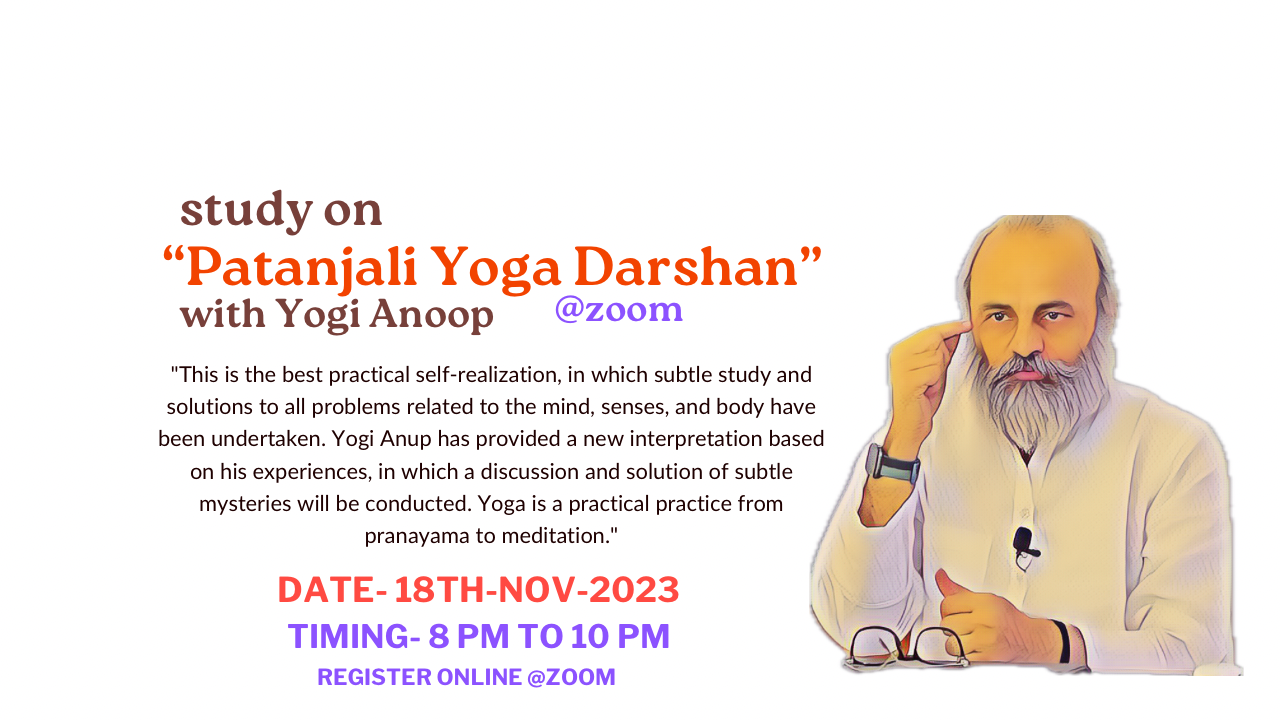
Patanjali Yoga Philosophy
2 years ago By Yogi AnoopA Deep Study about Patanjali Yoga Philosophy"
Let's try to understand the word "philosophy" first. The root meaning of the word "philosophy" is to see. The word "seeing" doesn't merely refer to seeing with the eyes; its meaning is much deeper.
An ordinary person interprets "seeing" as seeing with the eyes alone, but in philosophy, it means seeing visible and invisible objects through all the senses. It even means seeing the seer (self-realization). The seer not only sees the seen but also sees oneself through the medium of the seen.
Seeing the seer through the seen is called "philosophy." When we see any other person or object, two elements of knowledge are involved. First, there is knowledge of the object that is seen, and second, there is knowledge of the seer (self).
The seer, in addition to seeing the seen, also experiences oneself. This is what philosophy is. Essentially, philosophy is the experience of the self through the medium of the seen.
Let's try to understand - without the existence of the seen, the experience of the seer is not possible, and without the existence of the seer, the knowledge of the seen is not possible. This is why philosophers call it the metaphysics.
The literal meaning is that there are two Tatva or existence in this universe: one is the seer, and the other is the seen. One experiences the body (the seen) and, at the same time, experiences oneself (the seer). When the seer starts experiencing oneself through the medium of the seen, it is called philosophy or Darshan.
Now, let's understand the word "YOGA"
In common terms, it is referred to as union (connecting the seer with the seen), but in subtle terms, it is the separation of the seer from the seen (dissociation of mental fluctuations).
In childhood and ignorance, we are pleased with association, but the habit of excessive and undesirable association becomes so strong and harmful that it creates an imbalance in the mind, intellect, and body. Therefore, Maharishi Patanjali and other philosophers did not call it union; they called it separation. The target of saadhak is separation from objects. But if we speak via passive side then we have to explain this join with yourself.
When a person begins to experience oneself, they are established in their true nature, and the external objects automatically become insignificant. At that time, all things are transcended. This is what yoga is.
"Why Should We Study Yoga Philosophy!
In my spiritual experience, it becomes more crucial to experience oneself after a certain stage of life. The primary goal is to experience oneself, just as when you look in a mirror, the main purpose is not to see the mirror but to see yourself. Similarly, in life, the aim of all actions should be to experience oneself. However, the common mind gets entangled in the experience of external objects because it finds happiness in them. It clings to the form, color, and shape of objects, creating an attachment to them.
The problem arises because people become preoccupied with the shapes, colors, and forms of external objects, which, in turn, become a source of future problems. Not only does the mind become attached to the experience of objects, but it also distorts the perception of the self. This is why I call this distortion in the perception of the self as a "disease."
In my spiritual understanding, the experience of the self is of utmost importance. Just like in the case of a mirror, the mirror is not essential, but the reflection of oneself is. When the self experiences an object, it gives more importance to the object, just as the mirror gives more importance to the reflected image. This is why there is no attachment to the mirror; there is no infatuation with the mirror.
Similarly, "I" should not become infatuated with objects but should give more importance to the experience of the self. This is why, when the self is experiencing an object, it doesn't become attached to it, and there is no infatuation with the object.
In my spiritual vision, ignorance and lack of knowledge about the self result in a deep inclination towards the visible world. This delusion arises from the belief that the external world will provide complete satisfaction, making a person dependent on external things, leading to an unhealthy and unbalanced state. I call this state "disease."
According to me, an unhealthy state means that the soul, which is meant to experience, is engrossed in external objects that are not its true place. That is why it is considered unhealthy. It becomes healthy when the soul resides within itself and experiences itself. This state is called self-knowledge and self-realization.
I chose the teachings of Sage Patanjali because they make a concerted effort to explain self-realization and self-experience with great depth and practicality. Through these teachings, I have delved into the intricacies of the mind and also worked towards resolving physical issues."
Note-you can register through https://www.yogianoop.com/course/preview/7
Recent Blog
Copyright - by Yogi Anoop Academy
